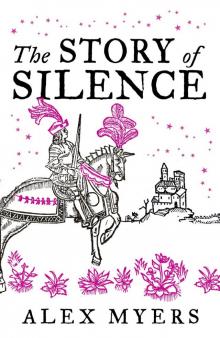- Home
- Alex Myers
The Story of Silence Page 7
The Story of Silence Read online
Page 7
The roads hadn’t been dry but a day when a messenger pounded down Tintagel’s causeway, his dappled gelding foaming at the bit. He wore a tabard of azure blue, with a gold lion passant on his chest: the king’s arms; the guards welcomed him within. The grooms took his horse, the steward showed him to the great hall, for he declined every offer of a chance to change out of his muddy leggings, or enjoy a quick repast, or at least a mug of hot wine. But, no, he must see the earl immediately, and deliver his message. And so Cador came down from his chamber, his clothing all a sombre black, his golden hair lank and hanging about his ears, his beard grown out now, scraggly and untrimmed (though Griselle had urged him to shave).
‘I see, my lord,’ the messenger began, ‘that this is a house of mourning. I am sorry for your loss, and sorry to intrude upon your grief. But the king’s message is urgent.’ From his seat at the head of the hall, Cador waved for him to continue. ‘The winter has seen unrest arise in Norway, and they have sent ships full of their finest warriors, restless after a long winter in their keep …’
Cador held up a hand to stop what would surely be a long and riveting description of all the terrible soldiers headed towards England’s coast. He was not in the mood for details. ‘And what does the king wish?’
‘He wishes you to assemble your knights and your retainers and ride with him against Norway.’
The words were barely out of his mouth when Cador rose from his seat and said, ‘Immediately.’
And so, all of Tintagel was thrown into an uproar. Grooms scurried to ready horses, sutlers dug through barrels of winter-stored apples and sacks of flour. Cador gave orders to the steward and then sought out Griselle, finding her sewing quietly as the babe slept.
She rose and gave Cador a curtsy as he entered. ‘My lord. Are you well?’
‘That matters little. It is time for you to take the child and go. I have prepared a place for you. It is a day’s ride away, no more, a place called Ringmar, which Earl Renald once used as a hunting lodge. You will find it most suitable.’ He glanced down at the babe in the cradle, a gaze that held doubt and fear and anger and longing. ‘The seneschal who runs the hounds there is a goodly man. He, and he alone, have I told of Silence’s Nature. You will leave in the morning.’
Earl Renald had been wise in his choice of location for the hunting lodge. Ringmar sat in the midst of a thick, wooded glen. Few travellers came down the track that led to the lodge; the nearest lord’s holding sat a morning’s ride away, and so the deer and grouse filled the woods, unused to and thus unafraid of human presence.
Griselle and her young charge rode in a cart, escorted by two guardsmen; the steward of Tintagel insisted on it. She had hoped that Cador would come for a final farewell, to kiss the child and perhaps shed a tear over the babe, who was, after all, the last earthly connection to his Roswyn. But the earl did not, and so they left Tintagel and took the road inland.
The roar of the sea soon faded behind them to dullness and then to nothing. Griselle held Silence in her arms (Mooch was shut up in a basket at her feet) and looked about at the countryside. She would have preferred to be on a palfrey, side-saddle; carts were for the old, the ill, the infirm. They passed through a little hamlet, then freshly ploughed fields lined each side of the track. The guardsmen murmured to each other and Griselle fell into a little drowse, lulled by the cart’s rocking. When she woke, the babe was fussy, and she soaked a rag in goat’s milk and let it suckle that (Mooch got what was left, dripped through the basket’s wickerwork). They were past the fields now, and she watched with interest as they travelled through a bog; some peasant had built a house on stilts, though why anyone would wish to live in a bog she could not fathom, and then the land levelled and dried out and she spotted a squat stone keep on a rise. As they drew nearer, she made out thatched cottages dotting the fields nearby. ‘Whose holding is this?’ she called to the guards.
‘Lord Wendell, m’lady. It is the nearest keep to Ringmar.’
‘Indeed?’ she replied. ‘And how much further is it to Ringmar?’
The guard squinted up at the sky; they had left Tintagel before Tierce and the sun had passed its height back by the bog. ‘We’re nearer to Ringmar than to Tintagel. I’d say we’ll be there before Nones.’
They passed the keep and soon the trees grew denser, closer, though the track was clear and firm. Griselle peered out of one side of the cart, then the other. Trees. And more trees. Here a little rivulet ran along the track, then crossed it, and the horses splashed through. In the distance, Griselle thought she spotted another house, but it was merely a clearing in the woods, where sunlight dappled down on new-green grass.
‘They call that Merlin’s Hollow, m’lady,’ one of the guards said when he saw her looking. ‘There’s a spring, with a waterfall.’
And on they rode. Two stone pillars on either side of the track formed a crude gate. ‘Here we are,’ said the guard. ‘Ringmar.’ The trees had been thinned and then cut back entirely, and Griselle could see that there was a garden in the midst of being planted, its new-ploughed furrows protected by a sturdily woven willow fence. A low stable sat to the left of the track, and a few thatched buildings to the right; one, Griselle thought, might be kennels (at least she heard quite a bit of barking) and another, given its square holes, a dovecote. And straight ahead, where the track ended, stood Ringmar.
Walls of knobbled grey stone rose twenty feet up. It lacked … grace; it was, simply, a stone box. There were windows, of course, and the door was arched and welcoming; Renald’s arms had been carved into the keystone, the only hint of ornamentation.
Griselle was just thinking that it reminded her strongly of the convent she had so recently been delivered from when a man stepped out from the doorway. ‘Welcome,’ he said, hurrying to set up a stool and offer a hand to Griselle as she stepped down from the cart. ‘M’lady.’ He gave her a bow. ‘I’m Geoffrey, the Seneschal of Ringmar.’ He was a man of middle age with grey in his hair and beard and a paunch of flesh about his midsection.
She arched an eyebrow. ‘Good sir. I’m Griselle, nurse to Silence, son of Earl Cador and Roswyn, may God keep her in heaven.’
‘Amen.’ The seneschal paused a moment. ‘It is sad news that speeds you here, but I am glad of your arrival. I have had the earl’s orders to make the place welcoming and comfortable for his son and the son’s nurse. Please,’ and he bowed again, gesturing for them to go inside. Griselle nodded to him and proceeded, as the guards dismounted and began to unpack the trunks and bundles they had brought with them from Tintagel.
The seneschal held the door for them, and Griselle gave him a demure nod as she passed by, alert for any signs of trouble. But his jerkin bore no stains; she caught no whiff of stale drink; his beard was, in fact, better trimmed than the earl’s, of late. Inside, two hearths stood, one on each end of the hall. Massive fireplaces, with andirons taller than Griselle. Fires burned low in each, and someone had taken care to strew the floor not just with rushes but with bundles of sweet grass and dried herbs, so that the air swirled with the resin of the smoke and the comforting tang of mint.
‘It’s simple,’ the seneschal said, ‘but pleasant.’
Indeed. As Griselle’s eyes adjusted to the dimness, she began to admire the tapestries that hung on walls without the hearths. Green and gold and brown, they depicted a forest scene, every bit as real as the one just outside the hall, each leaf worked carefully down to its veins, the bark stitched to show its bumps.
The seneschal stirred the fire in one of the massive hearths. ‘I expect it isn’t much, after Tintagel,’ he said.
Griselle stirred herself from her study – there would be winter evenings aplenty when these tapestries would be the only entertainment. ‘Life at court is bustling, true, always with messengers and guests coming to visit,’ she said.
‘Ringmar was made for a hunting party,’ the seneschal said, gesturing to the remaining wall decorations, around each hearth: boar spears and heavy wooden shields rou
ghly painted with coats of arms. ‘We hang the shields of all the barons and lords who have hunted here,’ he said. ‘I hear Cador has changed the arms of Cornwall?’
‘Yes, his lady wife did convince him to add a crow, at the top.’
‘Well, I shall amend his shield then.’
Upstairs, the seneschal showed Griselle to the solar, which she would share with Silence. The other chambers reminded her of cells at the convent, bare, simple spaces. ‘Not much sense in making these luxurious,’ the seneschal explained. ‘Most times, begging my lady’s pardon, the lords are in such a state by the time they retire, they can’t tell the difference between the stones of the hall and a bed.’
And Griselle threw her head back and laughed, startling the guards who were carrying in the bundles of her possessions. She plucked the basket containing Mooch from the top of the pile and set it on the floor. ‘I hope you like cats,’ she said to the seneschal.
He grinned through his beard, his brown eyes twinkling. ‘Love ’em,’ he said, ‘though they make me sneeze.’
Clasps undone, Mooch shot out of the basket, darted past the guardsmen, and hid under the bed in the solar.
‘Quick one,’ the seneschal said. ‘By the time we’re back, he’ll have caught a dozen mice.’
‘She,’ Griselle corrected. ‘Her name is Mooch.’
The seneschal gave her a funny look, eyes narrowed just a little bit, lips pursed, as if he wished to ask a question, but couldn’t find the words.
She returned the look, running over what she had said – was Mooch a hunting term, perhaps? No … Oh! Griselle’s eyes widened, and she shifted the baby from one hip to the other. ‘And this one’s name is Silence, a he, not a she.’ And she laughed again, though this time it was forced, and the seneschal joined in, giving her a knowing wink. The two guardsmen sidled past to bring in another load of baggage, wondering if both of them were mad.
The seneschal led Griselle out of the back door of Ringmar Hall. ‘Earl Cador ordered the matter never to be spoken of,’ he said, ‘and so we shan’t, though both of us know about the he, not a she. It will be a matter of silence between us.’ Another wink, as they emerged into the spring sunshine. ‘This is, or was, a rose garden.’ He indicated a few brown stalks. ‘I daresay it might benefit from a woman’s touch.’
‘I know little of flowers, except that I like their smell. But I will try,’ she replied.
Across the dirt-packed yard, he showed them the kitchens. ‘Cook will keep us well fed,’ he said, giving a nod to the hearty woman, her sleeves rolled to her elbows, who had her hands immersed in a ball of dough. And then back around the side of the hall, to the thatched buildings Griselle had noticed when they first arrived. ‘The kennel.’ The seneschal pushed the door open and a wave of dog smell and barking rolled forth. ‘Keep your lady cat far from here,’ he said. ‘These are trained for the hunt, though now and then one is ill-suited to the task and becomes a lap dog.’ He pursed his lips, considering his words. ‘It’s peculiar, is it not? That they should be bred, through and through, to be a hunting dog and yet it seems not be in their Nature.’ He shrugged and led them on, indicating the cottage where he slept, and the stables. ‘Do you like to ride, m’lady?’
‘Oh, I do,’ said Griselle. ‘I had the gentlest palfrey when I was a little girl.’
‘I’ll tell the groom to search out a suitable steed for you,’ he said. ‘The best of Ringmar is to be enjoyed while riding.’ He swept his hand to indicate the woods round about.
And as they stood there, the guards came down; the baggage was all unloaded, and they begged their leave. ‘The earl wished us to hasten back, as Tintagel prepares to ride to King Evan’s aid,’ they said, when they declined the seneschal’s offer of hospitality.
‘Long live the king,’ the seneschal cried. ‘Evan the Just! May you vanquish England’s foes!’
And Griselle took Silence’s little hand and had the baby wave farewell to the guards as they rode away home to Tintagel.
There was a little spring in the woods that Griselle and Silence walked to every day. Well, Silence walked there eventually. For their first year at Ringmar, Griselle would carry him. Sometimes the seneschal came with them, and when he did, he would explain all the wonders of the woods. At least those that pertained to hunting. How to find spoor. Where a fox would mark a tree and why. What it meant when the deer chewed on tree bark. Griselle said, ‘Oh!’ and ‘My!’ and Silence, when he could talk, would often choose not to, preferring rather to listen and think and then, as the other two walked on, put his finger to the raggedy bark and imagine how hungry the deer must have been.
At the spring, which sat on the edge of a lovely clearing, Griselle would perch on a rock and take Silence onto her lap. She taught him how one must behave properly at springs and always ask permission before taking any water. ‘Whose permission?’ Silence would say, and she would explain how springs belonged to nymphs, usually. But occasionally to piskies or fairies. ‘How will I know who to address?’ Silence once asked. For Griselle had begun lessons that winter in courtly manners and such matters as depth and length of bowing and proper use of titles bedevilled him, a child raised all alone, who had no one to address but Griselle, the seneschal, Cook, and the groom. ‘You must call all such guardians of springs “m’lady”,’ Griselle said.
‘They are always ladies? Why?’
‘Women are more drawn to water. By their nature, they are creatures of cold and damp, of water and the moon.’
If the seneschal was there, he would tell them the story of the nymph of this pool, who had once tricked Merlin into giving her a wish. ‘When Merlin was young, mind. He came through here. On a hot day, muttering to himself and looking for some mistletoe to cut, for one of his magicks. And quite distracted, he came to this spring and slurped a handful of water up, without first asking permission.’ And here the seneschal would take down the little wooden cup with its long handle that always hung from a branch above the spring and he’d offer it to Silence, who would take it solemnly and say, ‘M’lady?’ and all of them would wait for some reply: a rustle of branches, a ripple of water, the call of a crow. And he would dip the cup in and raise it to his lips: cold, wet, refreshing. ‘What happened to Merlin?’
‘Well, the nymph came up out of her spring, didn’t she? Pretty thing, she was, but don’t let that fool you. Powerful, too. Mark me, but that’s the way of women.’ Here he’d wink at Griselle, who would sniff and look away. ‘They beguile you with their looks and pretend to be all soft and mild, but they’ve a way of getting what they want.’
‘And?’ Silence prodded.
‘And she demanded to know who it was who thought he could take her water without her permission. She had a good mind to make that water freeze right in his veins. Oh, he tried to get out of any trouble. He promised to come back with a basket of hazelnuts, which nymphs love best, or that he’d bring her a precious stone. She asked what he had on him at that moment, but he had nothing, just the sickle to cut mistletoe. So she started to freeze the water that he’d stolen, toes first, then ankles.’ And here the seneschal would grab at Silence’s feet and make him laugh. ‘And Merlin felt that cold creeping up him, a magic just as good as his own, and said, “A wish! I’ll grant you a wish! Whatever you want!” and with that, the nymph let him go.’
‘What did she wish for?’
The seneschal considered this, cocking his head as if he were listening to the spring’s gurgle. ‘Well, now. I don’t know as she has made up her mind yet. She’s a woman, after all.’
Another sniff from Griselle. ‘Some springs,’ she interjected, ‘are holy to saints. I’ve heard tell of one saint, who was supposed to marry, but she heard the voice of God, calling her to be a nun. And when she told her fiancé this, he grew enraged, and he beheaded her. And where her head fell, a spring opened up, and its waters have miraculous healing powers, thanks be to God.’ And she crossed herself.
There were stories the seneschal told, on the long
winter nights, when Silence was only a few years old. Stories that were meant to teach Silence his place in the world. Stories of his father, Cador, and his grandfather, Renald. Stories of King Evan. Renald had been most famous for his jousting, and the seneschal would describe the stands at Winchester, the pitch, how Renald would hold his lance, and wear a ribbon from his lady love, wrapped about his neck. Or he’d tell of King Evan, when he had been younger, and how he rode out to defend the northern border against savages who sharpened their teeth and ate human flesh, and how King Evan defeated them, and brought peace to the land. ‘Because he is a good knight,’ the seneschal would say. ‘It is knighthood, the principle of it, the practice of it, that keeps England safe and well and at peace. For a knight is noble, and honest, and courageous, and will always fight in the cause of justice and honour.’ Silence heard those words so often, they were the first he spoke. Knight. Noble. Honest. And his earliest dreams swirled with the tales that he was told: sword fights and jousting and shining armour and a knight, ready to vanquish the terrible savage foes.
There was a horse, white with chestnut splotches, that Cador gave to Silence in his fourth summer. The earl visited Ringmar once a year, and he usually came with a cart of supplies, a few gifts, and the news from court. He’d stay a couple of nights and go out hunting. Sometimes he brought a lord or two with him, or invited the nearest neighbour, Lord Wendell, to join him in pursuit of a boar. For those few days Ringmar was transformed. Servants and extra grooms ran about, the dogs yipped and bayed with excitement and men’s voices boomed out commands. Cook churned out vats of stew and endless loaves of bread and complained that the servants the lords had brought were dimwits and thieves besides. In the merry chaos, Silence seldom spoke to his father, though sometimes he was allowed to tag along on the hunt.

 The Story of Silence
The Story of Silence The APOCs Virus
The APOCs Virus The Time Change Trilogy-Complete Collection
The Time Change Trilogy-Complete Collection Time Change B2
Time Change B2 Time Change Book One: The Jump
Time Change Book One: The Jump